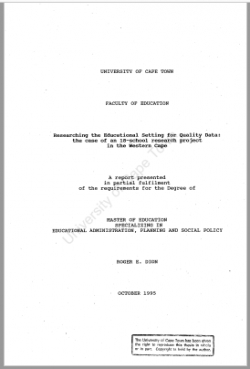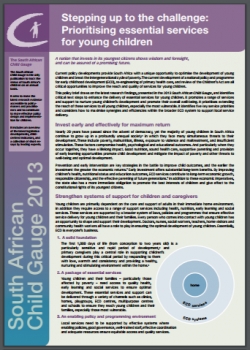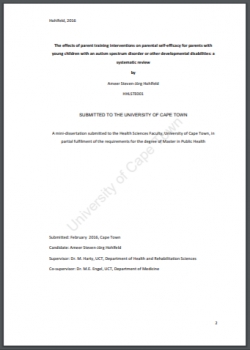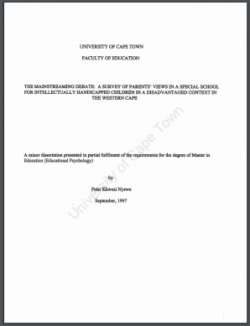Parent and staff perceptions of services offered to young children with disabilities at special schools

Type
Thesis
Authors
Category
ECCE
[ Browse Items ]
Publication Year
1997
Publisher
URL
[ private ]
Pages
134 p.
Subject
Early childhood care and education (ECCE), Children with disabilities, Young children, Special schools, Parent perceptions, Staff perceptions, South Africa
Tags
Abstract
This study explored the perceptions of parents and staff around the services offered to young children with disabilities in Special schools. Questionnaires were distributed to parents of young children with disabilities attending Special schools and to the professional staff working with these children. Six Special schools, under the auspices of the Western Cape Education Department and situated in the Cape Town Metropole, participated in the study. Questionnaires focused on the following themes: knowledge of disability, the nature and amount of contact enjoyed by staff and parents, the level of participation, consultation and decision making afforded to parents and staff and the extent to which parents and staff perceived that their needs were being met by the school. Findings highlighted a need among staff and parents for more knowledge around all issues of disability. This included information pertaining to disability as well as knowledge of the roles of various staff trained to work with the children. Parents voiced an additional need for information relating to their child's activities during a school day. Results also indicated insufficient contact between parents and staff This impacted on the level of consultation and decision making afforded to parents. It also affected the way in which staff viewed interaction with parents as well as their attitudes towards them. Differences in parents' and staff's perceptions of the extent to which the schools met the needs of parents varied from school to school. It appeared that meeting the emotional needs of parents of young children with disabilities by the schools needed particular attention. Socioeconomic factors appeared to influence responses, especially in areas around knowledge of disability and the amount of contact maintained by parents with the school. Even though many parents wished to participate more in their child's school activities, financial and social constraints were cited as factors preventing this. This study is relevant in a time when changes are being implemented in the Special Education system, particularly when a more meaningful involvement is being demanded of parents in all aspects of school affairs. Recommendations are thus aimed at empowering parents and staff, with a view to strengthening the partnership between parents of young children with disabilities attending Special schools and the staff working at these schools.
Description
Thesis (MPhil)--University of Cape Town, 1997
Number of Copies
1
| Library | Accession No | Call No | Copy No | Edition | Location | Availability |
|---|---|---|---|---|---|---|
| Main | 893 | 1 | Yes |




